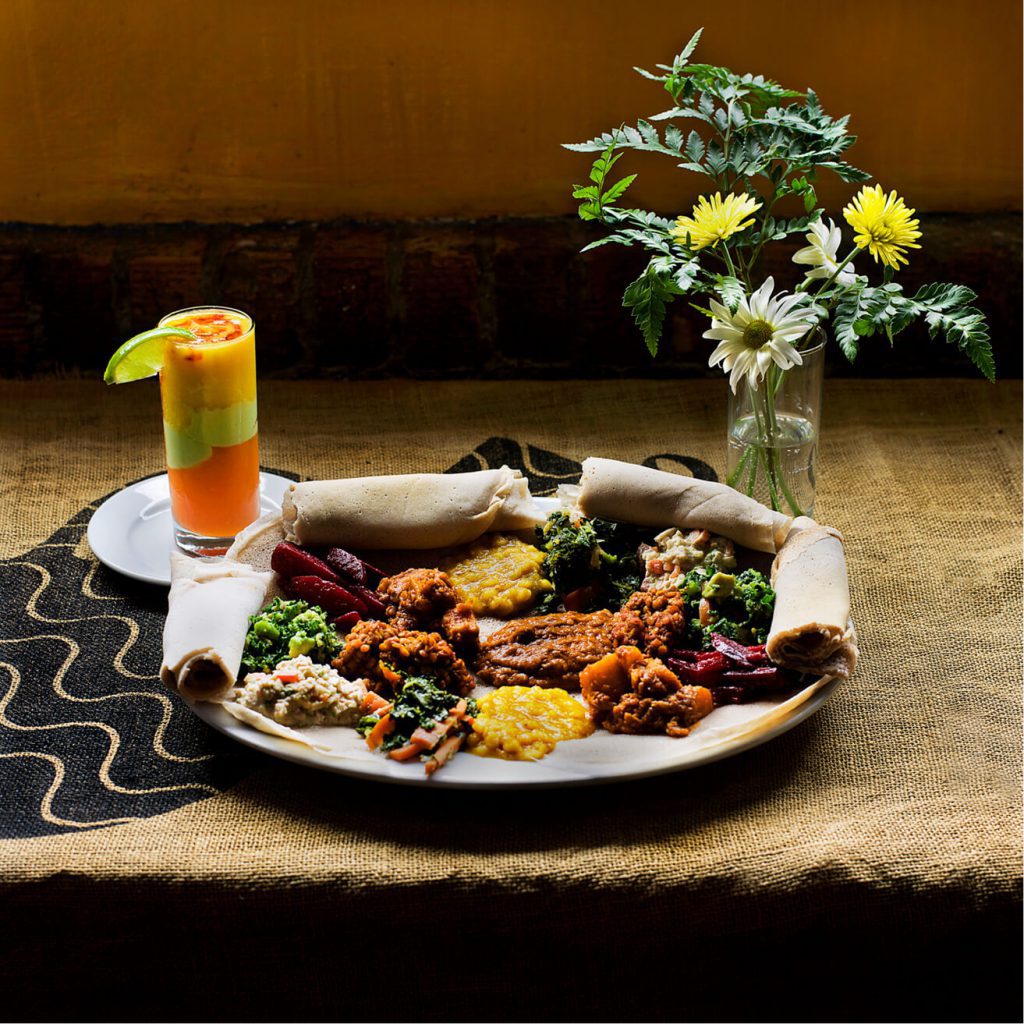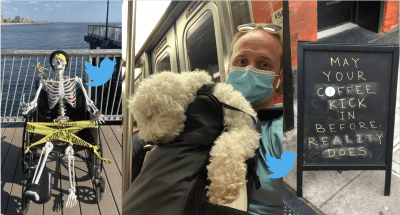Are People Still Eating Vegetarian in Brooklyn?


Feast for 2 and an Espris, Bunna Cafe.
Photograph by Joe Hume
Sam Saverance
Cofounder, Bunna Cafe (Vegan Ethiopian Restaurant, Bushwick)
Business is great! I feel that over the past couple years veganism has entered the “trend zone,” which means many more people are becoming part-time vegan as a method of cleansing or giving perspective to their lifestyles. With major celebrities like Jay Z/Beyoncé and the Clintons going part-time vegan, many others are following.
Our customers have always been a mix of hardcore vegan, part-time vegan, or not vegan at all—in fact, I would say the ratio of vegans-vegetarians to omnivores is slightly skewed to omnivores. Ethiopian vegan food is rooted in a centuries-old tradition within the Ethiopian Orthodox Church, where adherents abstain from animal products of any kind during Lent and other fasting times—as much as four months-a-year. So the cuisine we serve is meant to be eaten by both vegans and non-vegans, and it’s flavored to emulate the savory/full feeling of eating meat to get all these omnivores through the fasting seasons. (Ethiopia has an amazing meat culture.) In short, it’s good for everyone. Need proof? Both myself and my business partner eat meat, albeit in moderation.
I feel like the vegan joints that have appeared in the past few years espouse this trend of “vegan for everyone.” We see it in other establishments like Dun-Well Doughnuts, the vegan-themed bar Pine Box Rock Shop, Champs diner in Williamsburg, and the Cinnamon Snail lunch truck. These trends apply well beyond Bushwick. I see it in Williamsburg, Cobble Hill, Park Slope, all over.
I definitely think veganism is thriving, but perhaps in an unexpected way in that I think proportionally fewer people are following a strict lifestyle of veganism compared to those that are part-time vegan. But I feel that even if becoming part-time vegan makes someone more conscientious about what they eat, how their food is created, and how it affects them and their environment, then even part-time veganism is a positive thing for society.
Louis Coluccio
Owner, AL Coluccio (Italian Grocery/Deli, Bay Ridge)
We actually do a big spread daily of roasted vegetables: cauliflower, Brussels sprouts, sweet potatoes, and a mix of zucchini, carrots, and peppers, which are insanely popular. Also, our most popular sandwich, the Valentina, is vegetarian. So I would say catering to a vegetarian crowd is something that we’re aware of—to a certain extent. Customers have requested notes on our signage asking if there is any meat, chicken stock, etc. in our dishes: rice balls, soups, lasagna. I do think transparency, in terms of what ingredients you’re using, is something you have to be aware of overall. Customers, rightfully so, ask questions about what they’re eating—and where it comes from.
Elise Kornack
Chef and Co-Owner, Take Root (Contemporary American Tasting Menu Restaurant, Carroll Gardens)
I think how much one reflects on vegetarianism can be highly affected by three possible variables: nurture (i.e how one is brought up), education, and societal influence. Personally, my mother made dinner every night for our family, and of the seven nights we ate meat probably once, sometimes twice. As I grew older and began to cook for myself and my wife, I continued the same pattern but cooked with even less meat. We eat meat maybe twice a month in our house. I read a lot about animal welfare and acknowledge that as a chef in the 21st century, the majority of your diners expect that chefs are being responsible when choosing where to buy meat and are supportive of humane animal rearing.
Diners do care about where their meat comes from and will make a point to ask, so in that case, I better have the farm’s name in the introduction of any meat dish. The reason my answer reflects my feelings on eating less meat more than vegetarianism directly is because the two go hand in hand. I find that most people are not becoming vegetarians as much as they are becoming less omnivorous.
[Has that changed much since you’ve been in the business?] Not much, no. I’ve always tried to surround myself with chefs who take pride in being able to cook vegetarian cuisine. Not necessarily food for vegetarians, but vegetable-focused. There is nothing more satisfying than creating a dish where a vegetable is the focus and no one, not even the most hardcore carnivore, misses the meat.
[Does it make a difference that you’re in Carroll Gardens?] Maybe. I can’t really say because I have only lived here a year and am not terribly in tune with the inner workings of the residents day to day. Though I do feel like the education level in the neighborhood is high—there are a lot of food businesses doing things right, and this helps to inform the public, of course.
[What kinds of people tend to ask about vegetarian options?] You know, we’re in a unique position at Take Root because we’re tasting-menu-only and we don’t accommodate for vegetarians, though many do eat here anyway and just skip the one or two courses that contain meat and/or fish, which of course we appreciate. But as far as the “type” of person, the range is just so wide now; in the 21st century, vegetarians come in every shape, color, age, and gender.
[Do your answers to these questions change if I’m asking about vegans?] My answers would maybe change a bit. To me, it seems that veganism is a lifestyle whereas vegetarianism is a way of eating. I find that being vegetarian is much easier in this day and age, where menus are scattered with a good number of vegetable-focused options. For any chef worth her salt, cooking a tasting for a vegetarian should be easy; a vegan is certainly more of a challenge.
Chris Bouza
Owner, Cubana Social (Cuban-Caribbean Restaurant, Williamsburg)
Serving vegetarian and vegan options was written into our mission. I envisioned a space where omnivores, carnivores, vegetarians, and vegans alike could dine comfortably together at one table. And it’s very exciting to see that dream realized! At Cubana Social, we proudly celebrate the history of Cuban and Caribbean cooking. We serve traditional dishes straight from my own Grandma’s kitchen like Lechon Asado (eight-hour roasted pork) or Ropa Vieja (grass-fed brisket stew). I view eating animals as part of our collective history and culture as humans, most certainly with the Caribbean-inspired food we serve. But that narrative is evolving in a meaningful way, and we’re super excited to debunk the idea that this type of cuisine, specifically, is all about pork, beans, and fried food.
Some of our most popular dishes happen to be vegan—true story! Like our Kale & Avocado Salad, Seasonal Market Plate, Black Bean & Shiitake Burger, Chiquita Sandwich, Tofu Picadillo Empanada, and Crispy Avocado. Additionally, nearly all of our side dishes are vegan-friendly and true to Caribbean cuisine. Sweet plantains and yuca are of the earth and delectable for all. We’re excited about this as clean eaters but don’t make a big deal about it. Mother Nature deserves the credit here, after all.
That said, we add meat, stocks, dairy, butter, etc. to dishes only when we feel a dish calls for it. We highlight it, make it truly special, and celebrate the local sustainable farmers and fisherman we source our meat, dairy, and seafood from. These individuals, who I am proud to celebrate, are caring for animals humanely and giving back to the earth.
As a chef, I think vegetables are so much fun to cook. They hold flavor so damn well, there are thousands more varieties of plant species than meat, and their availability changes seasonally. That alone offers endless possibilities for creative challenges.
Is it a “Williamsburg thing”? I think so many neighborhood restaurants are catching on to a long-lasting, healthy trend. But it’s more than a trend. I do recognize that we all see a demand and are accommodating diners. Which is awesome! If we step outside this neighborhood, I think it’s important to acknowledge that Williamsburg as a whole is behind the times on both the vegetable and locally sourced scene when compared to other cities like Los Angeles, San Francisco, or Portland.
Since we opened in 2010, we have seen the demand for veggie options increase. I think that makes a lot of sense, and I predict it’ll continue.
You might also like 




















